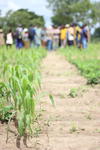Research groups
-
ACTINA – Action to innovate and transform agricultural technical systems
 Agriculture faces a major challenge: feeding a growing population while preserving natural resources and biodiversity and this in an increasingly uncertain context arising mainly from climate change. We have to reinvent agricultural systems to make them more sustainable and to ensure that they can provide ecosystem services essential to human welfare. Agro-ecology can help confront this challenge by offering to rebuild technical systems by mobilizing ecological processes in agricultural systems.
Agriculture faces a major challenge: feeding a growing population while preserving natural resources and biodiversity and this in an increasingly uncertain context arising mainly from climate change. We have to reinvent agricultural systems to make them more sustainable and to ensure that they can provide ecosystem services essential to human welfare. Agro-ecology can help confront this challenge by offering to rebuild technical systems by mobilizing ecological processes in agricultural systems. -
SIRA – Innovation and research system in agriculture and agri-food
 Organizations and institutions play a key role in innovation processes in agriculture and food sectors. All these organizations (NGOs, farmers organizations, private firms, extension services, research, etc.) form an innovation system that produces knowledge, brings together expertise, and helps mobilize resources so that actors can innovate.
Organizations and institutions play a key role in innovation processes in agriculture and food sectors. All these organizations (NGOs, farmers organizations, private firms, extension services, research, etc.) form an innovation system that produces knowledge, brings together expertise, and helps mobilize resources so that actors can innovate. -
ANIMAL'S LAB – Animals: innovations and living work
 Understanding the role of work in our relations with animals and with nature and to evaluate its impacts in terms of technical and social innovations.
Understanding the role of work in our relations with animals and with nature and to evaluate its impacts in terms of technical and social innovations. -
AGRICITES – Territorial innovations for the agroecological and food transition
 The continuing urbanization of the world is a challenge for UMR Innovation’s research, as this urbanization transforms human societies’ relationships with the environment, agricultural production and food, in both the Global North and the Global South. City-agriculture relationships, in particular, are subject to territorial recompositions and social confrontations, but also benefit from cooperation and innovations. These processes deserve to be identified, analysed and evaluated. It is this perspective that forms the basis of the mission of the AgriCités research group, which analyses situations of sustainable territorial innovations that link agriculture to the city, transform work in agriculture or contribute to the agroecological and food transition in urban, peri-urban and rural territories.
The continuing urbanization of the world is a challenge for UMR Innovation’s research, as this urbanization transforms human societies’ relationships with the environment, agricultural production and food, in both the Global North and the Global South. City-agriculture relationships, in particular, are subject to territorial recompositions and social confrontations, but also benefit from cooperation and innovations. These processes deserve to be identified, analysed and evaluated. It is this perspective that forms the basis of the mission of the AgriCités research group, which analyses situations of sustainable territorial innovations that link agriculture to the city, transform work in agriculture or contribute to the agroecological and food transition in urban, peri-urban and rural territories. -
EQUALITER – Equity - Quality - Food - Territory
 Food systems are undergoing rapid change. On the one hand, long supply chains are increasingly being formed at the global level. They are having a pronounced impact on the structure of territories and the interactions between actors of the supply chains. On the other hand, alternative models that promote regional development by leveraging local resources and by forging new producer-consumer relationships are emerging or managing to survive. Innovative institutional mechanisms – such as geographical indications, organic farming and fair trade – are being designed to promote these models and regulate exchanges between actors.
Food systems are undergoing rapid change. On the one hand, long supply chains are increasingly being formed at the global level. They are having a pronounced impact on the structure of territories and the interactions between actors of the supply chains. On the other hand, alternative models that promote regional development by leveraging local resources and by forging new producer-consumer relationships are emerging or managing to survive. Innovative institutional mechanisms – such as geographical indications, organic farming and fair trade – are being designed to promote these models and regulate exchanges between actors. -
DAM – Food Democracy in the dynamics of markets
 A reconfiguration of roles of market actors and societies can be observed through a reconnection between agriculture and food and through mechanisms underpinning this recomposition. This reconnection is conducive to the development of a food democracy, in which all stakeholders (including citizens, farmers and artisans) find ways of guiding the evolution of food systems towards more sustainable ones. Analyzed so far mainly in the context of advocacy networks, these dynamics are now expanding to a wider public and acquire sense in the light of contemporary societal changes in the North as well as in the South.
A reconfiguration of roles of market actors and societies can be observed through a reconnection between agriculture and food and through mechanisms underpinning this recomposition. This reconnection is conducive to the development of a food democracy, in which all stakeholders (including citizens, farmers and artisans) find ways of guiding the evolution of food systems towards more sustainable ones. Analyzed so far mainly in the context of advocacy networks, these dynamics are now expanding to a wider public and acquire sense in the light of contemporary societal changes in the North as well as in the South.